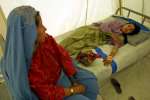- Text size
 |
|  |
|  |
| 
- Français
UNHCR disappointed at Australian decision to reopen detention centre for asylum-seekers
News Stories, 20 April 2010
CANBERRA, Australia, April 20 (UNHCR) – The UN refugee agency has expressed disappointment at the Australian government's failure to look at alternatives to detention for asylum-seekers arriving by boat who pose no health or security risk to the public. UNHCR, in a statement released by its Canberra-based regional office on Monday, also reiterated its firm opposition to the detention of asylum-seekers.
"The combination of mandatory detention, suspension of asylum claims and the geographical isolation of detention facilities such as Curtin Air Force Base in Western Australia – all without any effective judicial oversight – is a deeply troubling set of factors," UNHCR Regional Representative Richard Towle said.
The statement said experience had shown that "these measures are likely to have a negative impact on the health and well-being of people affected by the latest announcements, particularly those already suffering from torture or trauma before arriving in this country."
The Australian government announced last week it would temporarily freeze asylum applications from Afghans and Sri Lankans arriving by boat and on Sunday said it would reopen the remote Curtin Air Base in the north-west to house them.
"It has long been recognized that prolonged detention, particularly in isolated locations, can have severe and detrimental effects on the health and psycho-social well-being of those affected," the UNHCR statement said.
The refugee agency, while acknowledging the operational constraints over the capacity of the detention centre on Christmas Island, said the choice of isolated Curtin Air Force Base as a detention centre would make the provision of essential social services very challenging, "particularly for those who may be in detention for six months or longer while subjected to the government's processing freeze."
The statement also said UNHCR cautiously welcomed the decision to move unaccompanied minors to community facilities in the southern city of Port Augusta as preferable to detention on Christmas Island.
"The detention of children is inappropriate and we hope that Port Augusta will be an open and community-based facility where essential services are available to protect the best interests of children accommodated there," said Towle.
UNHCR will continue discussions with the government on how to minimize the impact of its suspension of asylum claims and continued mandatory detention arrangements on the health and welfare of asylum-seekers in Australia.
More than 1,800 asylum-seekers have arrived in Australia by boat since the beginning of the year, mostly from Sri Lanka and Afghanistan.
















































